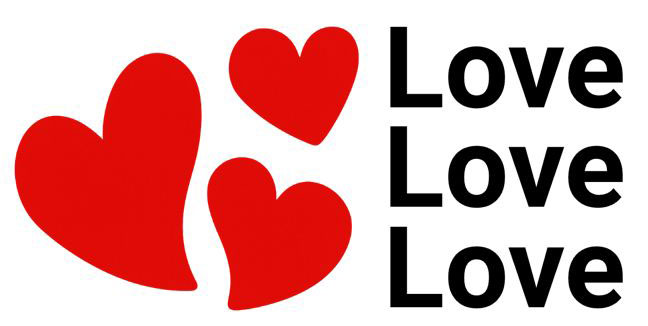
Join The Love Revolution
...IT'S WHAT REALLY MATTERS

The Most Powerful Source In The Universe
There is a force in this universe more powerful than any force imaginable. It cannot be manufactured, bought, or sold. It flows beyond the boundaries of race, language, and belief. This force builds up and tears down evil, heals the deepest wounds, and breaks the strongest chains. It gives life meaning and reveals the purpose behind existence itself.
That force is love.
From the very beginning of time, humanity seemed to intuitively understand that love was sacred. The earliest religions, spiritual teachings, and philosophies—Judaism, Hinduism, Buddhism, Sikhism, Islam, and Christianity—all began with a central truth: Love is the foundation. Love is the commandment. Love is the way.
The Original Message Was Love
Long before institutions formed and doctrines hardened, the heart of faith was always love. Let’s look back and remember what each of these great traditions originally understood:
Judaism
At its core, Judaism was a love story between God and His people. The Shema declared: “Love the Lord your God with all your heart, soul, and strength.” And the prophets constantly cried out that what God truly desired was mercy, not sacrifice. Justice, compassion, and humility were the heartbeat of Torah.
Hinduism
The Bhagavad Gita speaks of bhakti—pure devotion and love for the Divine. The Upanishads described a universal Self that dwells in all beings. Hindu sages taught that to love God was to see God in everything and everyone, and that ahimsa (nonviolence) flowed from this sacred love.
Buddhism
At its root, Buddhism offered a path of compassion. The Buddha’s teachings centered on ending suffering through right understanding, mindfulness, and loving-kindness (metta). Enlightenment wasn’t about escaping the world, but loving all beings without attachment or aversion.
Islam
Though often misunderstood, Islam’s foundation is mercy. The Qur’an begins with “In the name of God, the Most Compassionate, the Most Merciful.” The Prophet Muhammad taught kindness to orphans, forgiveness to enemies, and love as the essence of true faith: “None of you truly believes until he loves for his brother what he loves for himself.”
Christianity
Christianity started with the most radical and intense call to love the world has ever seen. Jesus didn’t just teach love—He embodied it. He loved enemies, touched lepers, wept with the grieving, forgave His murderers, and willingly gave His life for all, out of pure, selfless love. He revealed God not as a distant judge or abstract energy, but as a tender, intimate Father—calling Him Abba, meaning “Daddy.” He taught that the greatest command is to love God with all our heart, and that the second is to love others as ourselves. He made it clear that His true followers would not be known by their rituals or doctrines, but by the way they love.
Love Has Been Lost
But over time, that message was lost. Forgotten. Replaced. In its place came rules, rituals, hierarchies, traditions, and tribalism. And in doing so, the greatest power in the universe was silenced.
There is another force at work in this universe—the shadow of love. It is not merely hate, but something deeper and more insidious: disconnection. Where love connects, this force isolates. Where love forgives, it festers. Where love gives freely, it clutches in fear. This force takes many forms—pride, fear, control, apathy—but at its root is a turning away from love. It is the great divider, the deceiver, the destroyer. It feeds on suspicion, anxiety, and selfish ambition. And it grows wherever love is absent.
The religions and philosophies that were born in love have, over time, been overtaken by this opposing force—transformed into something unrecognizable to their founders, far removed from the pure love they were meant to embody. The core message of love has been buried beneath layers of tradition, rules, regulations, rituals, control, and institutions—disconnecting us from the very source of unconditional love and robbing us of the profound beauty of giving and receiving that love with one another. It has disconnected us from the source of love and love for each other.
Judaism began as a covenant of love between a personal God and His people—a relationship rooted in faithfulness, mercy, and justice. But over time, that living relationship turned into a religion of law. What began as walking with God became walking according to rules. Instead of reflecting the heart of God—compassion for the poor, the outcast, and the foreigner—many leaders focused on ritual purity, legal debates, and national identity. The prophets who cried out for love and justice were stoned or silenced.
Today, many expressions of Judaism revolve around tradition, preservation of identity, and debates over law—not intimacy with the God of love. Though beautiful prayers remain, and a longing for Messiah endures, for many the spiritual power has diminished. The sacred intimacy between Creator and creation faded into memory—disconnected from the fire of divine love and the tenderness of loving one’s neighbor.
Hinduism began as a reverent search for the One Divine Spirit behind all things—a path of devotion, unity, and awe for the sacredness of life. Yet as it evolved, that unity fractured into thousands of gods, castes, and rules. The inner spark of devotion was overtaken by rituals to please deities and secure blessings. The teaching that all life is one became inconsistent with a rigid caste system that divided humans by birth. Fear of karma and obsession with rebirth replaced the joy of divine communion.
Today, for many, Hinduism is a cultural identity marked by festivals, yoga, chanting, and temple rituals. The search for God has often been replaced by a vague idea of energy or spiritual enlightenment. Yoga, once a sacred path of devotion, is now a wellness trend or fitness brand. The soul’s intimate hunger for divine love was diluted into abstract energy and endless practice—disconnecting the heart from the transforming power of love itself.
Buddhism began when Siddhartha Gautama stepped down from his throne to walk among the suffering, radiating compassion and presence. He taught a path of mindful love—seeing and relieving suffering without judgment. He sat with beggars, spoke with kings, and gently guided seekers away from illusion and toward freedom through compassion. But in time, the warmth of shared humanity cooled into impersonal detachment. Emotion, desire, and even relationship were seen as distractions. Meditation became escape rather than embrace. The noble path of love became a private pursuit of self-liberation.
In the modern world, Buddhism is widely admired for its peace—but has often been reduced to mental techniques. Mindfulness is used to manage stress. Meditation becomes a path to personal stillness and self-improvement, rather than loving awareness of all beings. The compassionate movement that once walked among the broken now often encourages retreat from society. The radiant love that once moved through villages and embraced the hurting was replaced by a solitary silence—disconnected from the living flow of love to and from others.
In Islam the prophet Mohammed started by walking in peace among a polytheistic people, urging them to turn to one loving Creator—Most Gracious, Most Merciful. He championed justice, generosity, and the equality of all before God. But as his movement grew in numbers and resistance increased, the tone of the revelations shifted. The Prophet, once a humble spiritual teacher, became a political leader and military commander. Later verses allowed violence against opponents, called for religious conformity, and established legal authority through force.
In the modern day, for many, it is now primarily about obedience, community boundaries, and protection of doctrine. The tender, personal connection to the Most Merciful is often obscured by rules, political agendas, or fear of apostasy. The mystical Sufi path, once rich in divine love, is sidelined or condemned. The Prophet’s original message of mercy and remembrance shifted into authority and control—disconnecting the heart from the source of divine love and the free-flowing love of others.
Christianity began with a man who called God “Abba” and gave His life for enemies—a love so radical it broke religious norms, healed the rejected, and forgave the guilty. Jesus said His followers would be known by their love. But over time, this pure message of love was overtaken by institutions, doctrines, and systems of control. Instead of living in intimate love with Christ, many began debating theology, policing morality, and dividing over denominations. The early, organic movement of radical love became an empire religion. Crusades, inquisitions, and colonization were done in His name. The symbol of selfless sacrifice—His cross—was turned into a banner of conquest.
Today, Christianity in many places has morphed into a message of rules and moral performance. In other corners, it has become a prosperity formula—a transactional faith where giving or believing “right” leads to blessings and success. Elsewhere, it’s a self-help philosophy dressed in religious terms, promoting behavior modification, positive thinking, and the “best version of yourself.” At best, many churches preach trying to imitate Christ rather than loving Him with all their hearts. What began as a personal, burning love for God and others has, in many cases, become a disconnected program of striving, performance, and surface transformation—losing the soul-changing power of divine love itself.
Why Love Was Hijacked
If love is so powerful—why has it been so buried?
Because love is dangerous to the systems of this world.
The powers that be—governments, religious institutions, ideological machines—have long known this: a people truly filled with love cannot be controlled. Love doesn’t rage. Love doesn’t divide. Love doesn’t obey out of fear. Love sees clearly. Love chooses freedom. And most dangerously, love unites.
So what do these systems do?
They stir outrage. They feed anxiety. They provoke division. They trap us in endless debates, drown us in rules, entice us into tribal pride, and fill our heads with doctrinal superiority.
They also do something sneakier: they turn us inward. Self-help, self-optimization, self-branding. They make “personal peace” the highest good. We are trained to chase enlightenment, manifestation, achievement, and individual success while ignoring the hurting neighbor beside us.
We become obsessed with becoming the best version of ourselves, while forgetting the best thing we were ever created for: to love and be loved.
So the message of love—raw, wild, divine love—was hijacked.
Because love is the one force they cannot defeat.
One of the most insidious reasons love was hijacked is the rise of ego—both in individuals and institutions. The ego, by nature, seeks control, superiority, and validation. Love, on the other hand, requires humility, vulnerability, and equality. As spiritual movements grew, charismatic leaders, scholars, and rulers began inserting their own interpretations, often elevating themselves as gatekeepers of truth. What began as a humble path of love and compassion turned into systems of hierarchy and exclusion.
The ego cannot stand the simplicity and surrender that love demands—it craves rules to master, doctrines to defend, and enemies to defeat. And so, over time, love was sidelined. In its place rose fear-based obedience, intellectual pride, and the pursuit of moral dominance. Instead of serving the poor, many sought to control them. Instead of becoming childlike, many became legalistic. The ego hijacked love by convincing people that being right was more important than being loving. And in doing so, the very heart of every major tradition was quietly replaced by the mind’s desperate need to feel superior.
Love Has Not Been Lost Completely
But love was never fully lost. Throughout history, there have always been individuals—and at times small, quiet communities—who clung to the core message of love. In doing so, they tapped into its extraordinary power, and some ignited movements that changed the course of nations and transformed countless lives.
Gandhi, who embraced nonviolence and forgiveness even in the face of brutal colonial oppression, declared, “Where there is love, there is life.” He believed that love was not weakness but the ultimate strength, able to overcome hatred, fear, and injustice. His philosophy of ahimsa (nonviolence) was rooted in compassion and reverence for all life, and it awakened the conscience of millions. Through love, he helped liberate a nation without raising a weapon.
Nelson Mandela, imprisoned for 27 years under one of the most dehumanizing regimes in modern history, walked out of prison not with a heart full of bitterness, but with one full of forgiveness. He famously said, “No one is born hating another person because of the color of his skin… People must learn to hate, and if they can learn to hate, they can be taught to love.” Through his unwavering commitment to reconciliation, he chose unity over vengeance, compassion over division. Through love, he dismantled apartheid and reimagined a nation.
Martin Luther King Jr., standing at the forefront of America’s civil rights movement, preached a gospel of radical love. He called love “the only force capable of transforming an enemy into a friend,” echoing Jesus’ command to love our enemies and bless those who persecute us. Despite violence, threats, and imprisonment, he never wavered from his conviction that love was stronger than hate. Through love, he shook the conscience of a nation and left a legacy that continues to echo through the generations.
Beyond these world leaders, countless individuals throughout history have embodied the power of true, unconditional love. There was the mother in apartheid South Africa who forgave the officer who killed her only son—and, in an act of staggering grace, welcomed him into her home as her new son. There was Corrie ten Boom, who survived a Nazi concentration camp and, with a trembling hand, forgave one of her former guards face to face. In both stories, love triumphed over hatred, pain, and vengeance—revealing a divine strength that transcends all.
Love is powerful. Love is what wins. Love is what heals. Love is what satisfies. Love never fails.
This is a call to remember
To return
To awaken once again to love, love, love
This is where life is lived to its fullest degree. This is what you were meant for. This is where you belong…
Love From God
Learn how to know and experience the unconditional, powerful and immense love of your creator. More than a distant God or obscure force, but a personal, loving Father who counts the very hairs on your head, loves you more than you can imagine, wants to bless you and live in a loving comforting and powerful relationship with you.
Love To God
Learn how to love the source of love with all of your heart, soul, mind and strength. Experience a personal and close bond of love, comfort and peace that comes from being loved and loving the true source of powerful unconditional love in a relationship of love. Experience a first love relationship with the creator of all things and the source of love.
Love For Others
When you are filled with the powerful source of love there is but one response and that is to love his children (your brothers & sisters) with the same fervent, sacrificial and unconditional love. Learn how to open your heart once again to loving relationships to those close to you, your loving partner, all those around you and even your enemies.

